
35 minute read
Weird
Questionable Judgment
Ukraine International Airlines has banned a traveler from all future flights with the carrier after the unidentified woman opened an emergency door on a Boeing 737 and went for a walk on the wing as it was waiting at a gate at Boryspil International Airport in Kyiv. CNN reported the passenger had traveled from Antalya, Turkey, with her husband and children in the Aug. 31 incident, when other passengers heard her say she was “too hot” before she popped open the emergency exit and went outside. The airline criticized her for setting an inadequate “parental example” and threatened she may face “an exceptionally high financial penalty.” Airport security and doctors on the scene determined she was “not under the influence of alcohol and/or drugs.”
A 51-year-old man from St. Cloud, Minnesota, was released from the Sherburne County Jail in Elk River on Sept. 12, but as he left the facility, he decided to take with him a DoorDash delivery that had been intended for a correctional officer working there. The Star News reported the officer contacted the former inmate by phone to inquire after his $29.13 order, and the man said he thought his family had sent it to him. He was cited for theft.
Oops!
Officials in Dania Beach, Florida, recently upgraded signs welcoming visitors to their city, including a small one that has greeted drivers for years along Dania Beach Boulevard, but local activist Clive Taylor took exception, pointing out that the sign is actually in Hollywood, not Dania Beach. “The little sign was bad enough,” Taylor, who is vice president of the Hollywood Historical Society, told the Sun Sentinel. “But to have Dania put up this mini-billboard with lights on it is wrong.” Hollywood Mayor Josh Levy says he’s confident the two towns can work together to resolve the issue.
An octogenarian in the village of ParcoulChenaud, France, set off a violent explosion in his attempt to kill an annoying fly, the BBC reported in early September. Not realizing a gas canister in his home was leaking, the man used an electric fly swatter to battle the insect and caused an explosion that destroyed his kitchen and damaged the roof of his home. While the man was mostly unharmed, he has had to move to a local campsite while his family makes repairs to the home.
Chutzpah
Three unnamed Metro-North Railroad employees were suspended without pay on Sept. 24 for turning a storage room under New York City’s Grand Central Terminal into a man cave, complete with a television, refrigerator, microwave and futon couch, according to the Metropolitan Transportation Authority. The Associated Press reported that investigators found the space after receiving an anonymous tip in February 2019 that the three -- a wireman, a carpenter foreman and an electrical foreman -- had built a secret room where they would “hang out and get drunk and party.”
Nature
Caesar, a 16-year-old alpaca at the Alaska Zoo in Anchorage, was killed on Sept. 20 by a wild brown bear that tunneled under a fence while the facility was closed then left. Caesar, who had lived at the zoo for 15 years, was “a crowd favorite,” executive director Patrick Lampi told the Associated Press. The bear had been hanging around the zoo, knocking over trash cans and breaking locks, and was later euthanized when it returned. Caesar’s companion alpaca, Fuzzy Charlie, escaped the attack and was unharmed. Lampi said a similar incident took place about 20 years ago; that bear was captured and relocated to Duluth, Minnesota.
Collections
September 22 marked the 60th anniversary of the day 14-year-old Boy Scout Steve Jenne scored a special memento of then-Vice President Richard Nixon’s campaign visit to Jenne’s hometown of Sullivan, Illinois. Nixon took a bite of a buffalo barbecue sandwich that day, then set it down. “I looked around and thought, ‘If no one else was going to take it, I am going to take it,” Jenne told the Herald & Review, and the leftover has been in a glass jar in Jenne’s freezer ever since. In 1988, word of the sandwich earned Jenne a spot on “The Tonight Show With Johnny Carson” and led his acquiring half-eaten items from Carson and fellow guest Steve Martin, as well as Tiny Tim and Henny Youngman.
Smooth Reaction
A 78-year-old Spanaway, Washington, woman was alerted by her barking dog on Sept. 20, and opened her door to find “a man,” she told KIRO, standing in front of her. As “he turned and started to leave,” the woman, identified as Sandy, said, “Oh, no, you don’t,” and picked up her shotgun and cocked it. The alleged intruder plopped down on her porch steps and the two waited for police to arrive. “You know, I’ve got grandchildren your age!” Sandy told him. Pierce County Sheriff ’s deputies took the man into custody, but Sandy didn’t press charges.
Government in Action
The Opa-Locka (Florida) City Commission voted 4-1 on Sept. 9 to repeal a 13-year-old ordinance that made wearing saggy pants a crime, the Miami Herald reported. Around town, visitors can see signs reading, “No ifs, ands or butts ... It’s the city law!” and showing two young men with low-riding waistbands, but Vice Mayor Chris Davis explained: “I felt it disproportionately affected a certain segment of our population, which is young African American men.” The ACLU of Florida agreed.
Frontiers of Farming
Cockroach farms are not new in China, where the bugs have long been used in Chinese medicine, but a new facility near the eastern city of Jinan is gaining attention as a way to deal with food waste while producing organic protein supplements for animal feeds. In four industrial-sized hangars, Australia’s ABC News reported, rows of shelves are filled with food waste collected from restaurants through an elaborate system of pipes. A moat filled with roach-eating fish surrounds each building to keep the roaches from escaping. “In total there are 1 billion cockroaches,” farm manager Yin Diansong said. “Every day they can eat 50 tonnes of kitchen waste.” Said project director Li Yanrong, “If we can farm cockroaches on a large scale, we can provide protein that benefits the entire ecological cycle.”
ScheduleyourFREEsiteassessmentfor solarenergyatyourhome,farmorbusiness 888-90-SOLAR





A PANDEMIC RECKONING
Fewer people are getting arrested as a result of COVID-19 and for those that do, it is easier to get bond. That’s caused some problems over the past six months, but it’s also caused some to reconsider jail’s role in society.

In one case, a man was accused of molesting a girl under the age of 13. At his preliminary hearing, the girl testified, and the evidence against the man was presented in court. Instead of awaiting trial in jail, however, the man was put on a GPS tether and allowed to await trial under house arrest.
“That’s something that, from my perspective, is very hard to explain,” said Noelle Moeggenberg, Grand Traverse County’s prosecuting attorney. “It was like: Our case just got stronger, we have evidence on the record, and then this happened.”
In another case, a man accused of domestic violence got out of jail on bond and contacted his victim afterward, a serious violation of the terms of his release. Nonetheless, after he was re-arrested, the defendant got bond again.
“That was really hard for my office to deal with, in terms of explaining to victims,” she said. “There are guidelines for the police and the courts.”
RECONSIDERING JAIL
The aforementioned cases are two examples on one extreme end of the spectrum. Over the last six months, because officials are trying to keep jail populations lower and, as a result, safer during the pandemic, there are many more people arrested in Grand Traverse County who have spent less time in jail than similar cases would require yet have not posed any threat or caused additional trouble.
As a consequence, some of the measures taken in Grand Traverse County to reduce the jail population is prompting officials to reconsider who should be in jail and why. Will the circumstances of the pandemic cause the system and society to reexamine the use of jail?
“I think it already has,” Moeggenberg said. “Maybe not punishment as much, at least not in our area. I think that we get, for the most part, fair sentences up here.” But Moeggenberg thinks that the pandemic will prompt continued reevaluation of pre-trial detention in some cases.
Of course, things were changing even before anyone heard of COVID-19, Moeggenberg said. In the last couple of years, prosecutors, judges, and policymakers in Northern Michigan and across the country increasingly have been questioning who should be in jail, especially while cases are pending and before a person has been convicted.
More and more, in nonviolent cases in recent years, judges have been freeing defendants on personal recognizance, or P.R. bonds, meaning the accused doesn’t have to pay anything to get out of jail while their case is pending.
“[P.R. bonds] just got really ramped up with COVID-19,” Moeggenberg said.
Take, for example, someone who is arrested over a weekend for shoplifting or being drunk and disorderly. Up until recently, it would have been standard for them to be held on a bond unless they could pay $50 or $100 to be released. But a lot of people under those circumstances cannot come up with $50 or $100.
“There were some people, unfortunately, who were held because they couldn’t post that money,” Moeggenberg said. “Now, 95 percent of those people are getting P.R. bonds.”
In other, more serious cases, suspects can be released on a G.P.S. tether, unless they are deemed a threat to public safety.
A GPS tether helped in the case of the molestation defendant who was released on bond after his preliminary examination. Moggenberg said that particular defendant has a history of showing up to court, and authorities were confident that he could be kept away from children while released.
Moeggenberg added that the jail recently received a grant that pays for GPS tether monitoring so that more defendants who are awaiting trial can be subject to house arrest even if they cannot afford the costs.
“NOT GOING TO DEAL TODAY”
Once the pandemic arrived in Northern Michigan, not only did the jail population have to be lowered but also trials became much more complicated for judges to hold. Jury selection for the circuit court in Grand Traverse County, for example, has been moved to the nearby Old Town Playhouse theatre. During trials, jurors are spread out throughout the courtroom. The public cannot attend; they have to watch on YouTube. And because the courts are behind and trials take much longer to occur, defendants in many cases have to be released pending trial because the judge cannot justify the delay.
Moeggenberg said that, as more and more people have been released on bond in the last six months, no-shows have become increasingly common in circuit and district court, with some bonded individuals missing court hearings slated to happen over Zoom and later claiming they were unable to get into the session through their computer, or not showing up for jail by 5pm on their appointed day, as they’d been told
to do when the judge sentenced them.
It’s human nature, in some cases, she said. Before the pandemic, the person would have been sentenced in person by a judge and then would have immediately been taken into custody by a bailiff. When the person is sentenced online and told to report to jail that leaves them with time to think over the situation and often talk themselves out of following through.
“To some extent, there’s that element of ‘I’m not going to deal with today what I don’t have to,’” Moeggenberg said. “I think a lot of people in the system in general kind of have the mindset that ‘I’m not going to worry about it today.’”
Although Moeggenberg said she hasn’t yet looked at the overall statistics to determine whether the area’s more generous system of releasing people facing charges has prompted an increase in crime, she provided Northern Express with a list that gives a small glimpse of the situation: the cases of six people who had been released from jail under the pandemic guidelines then went on to commit new crimes, plus two who had likewise has been released and violated the conditions of their release by contacting victims.
SECOND LINE OF OFFENSE
Circuit Court Judge Thomas Power said he hadn’t noticed that there had been a large uptick in the number of defendants not showing up for virtual court.
He said those that don’t will likely get picked up by police eventually, and if they do represent a threat to public safety, the police will make it a priority to get them back.
“The theory is that they’ll be found eventually, but that’s kind of up to law enforcement,” Power said. “You put people on bond, and some people aren’t going to show up.”
Power said the situation is likely more complicated because most of the people who are in the system and then abscond are addicted to drugs or alcohol, and addiction can be a powerful incentive for them to skip out.
“People are getting picked up in Grand Traverse County,” Power said, but adds that some defendants have figured out that there are certain areas downstate where they can

go, places where their bench warrant from who are sentenced by the judges and provide “I have always believed we have too many Northern Michigan will be a low priority for a safe environment here and take care of their people in jail or that jail sentences are too the police or maybe of no interest at all. needs,” he said — but allows that the reduced long,” Risk said. “I also feel we have made a lot
Nevertheless, Power said he understands population numbers have enabled him to of progress into being more thoughtful about why the criminal justice system must cut make the jail safer. why there needs to be a jail sentence and incarceration numbers during this time. In 2019, the jail averaged a population of how long that should be. More opportunities
“Running the jail in the era of COVID-19 140 inmates per day; since March 16, the day are given to show a defendant can be selfis very difficult,” Power said. “They quarantine the lobby doors were locked to the public, the correcting.” new inmates. They’re doing everything they can jail has seen an average daily population of 92. Risk said he is not aware of any statistics to stop the virus from spreading to the inmates.” In March, it was as low as 81, Barsheff said. that show more crimes have been committed
If a defendant gets charged and convicted The lower numbers enabled jail staff because there are fewer people in jail. for absconding from bond, the maximum to clear out a section of the jail to make an “I’m guessing that if there is a second penalty is a four-year sentence added on to isolation wing where people brought into the offense while someone is on bond, the police whatever other trouble they might face for the jail could be screened and quarantined for 14 will go and pick someone up. The seriousness original charge. days if necessary. of the offense should also come into play,” he
And even a prosecutor doesn’t charge a Barsheff also said the low population said. “The more danger posed to the public, person who absconded and is caught, that numbers enabled the jail to save money; they the more likely the court would take action.” person will still face consequences for not were able to shift around staff and cover for Risk agreed that the measures taken during the pandemic are continuing a trend that had already started.
“I believe the judicial system as a whole is “I believe the judicial system as a whole is moving toward less incarceration,” he said. “A giant step was taken with the implementation moving toward less incarceration.” of the treatment courts.” For example, he said, not long ago, 80 percent of the participants who go into sobriety court today would in the past have been charged with a felony — something that showing up to jail or court, Power said. vacations and people off for training without would require spending at least 30 and up to 93
“It’s not a positive, because they’ve probably having to resort to overtime pay to cover the days in jail upfront. been out doing bad things after they absconded,” extra shifts. If arrests start to increase and more Today, people in that situation in Grand he said. “They have to start over, get dried out, people are put in jail, he said he will need to hire Traverse County don’t spend that time in jail, and back on a treatment program.” more staff — and require the funds to do so. and sobriety court has a 93 percent graduation
What they were doing while out will be While Barsheff said he understands why rate, he said. investigated and taken into account, he said. some people sentenced over Zoom and told to Philip Settles, another Traverse City report to the jail at a certain time might take defense attorney, said he doesn’t have stats QUARANTINED IN JAIL the risk and avoid showing up to be locked but doesn’t think that having fewer people in
So far, Grand Traverse County officials up, he’s witnessed some surprises, too. He jail today is resulting in more crime. He also have been able to keep COVID-19 from its jail. remembers one man from downstate who, thinks that a lot of times, people don’t show
Capt. Chris Barsheff, the Grand Traverse during his online sentencing to prison for a up for court during the pandemic because a County Sheriff ’s jail administrator, said that Grand Traverse County felony case, was told to lot of them do have trouble getting online and so far, there have been no positive novel drive up to Traverse City to turn himself in at logging in. coronavirus cases in the jail. the jail. The man showed up on time. “I do not think that the lesser jail
“We came up with a really good protocol to “That’s responsibility there,” Barsheff said. population means more crimes are being help mitigate the spread of the infection in the committed,” Settles said. “My opinion is based jail and, knock on wood, we haven’t had any “TOO MANY PEOPLE IN JAIL” upon the number of bond and probation cases yet,” Barsheff said. Mark Risk, a defense attorney who helps violations going down or staying steady. I am
He said it’s not up to him who goes to run the drug and sobriety courts in district guessing that people really, really do not want jail or who doesn’t — “From the jail end, our court, said he believes people should spend less to be in jail.” responsibility is to basically house inmates time in jail. Northern Express Weekly • oct 05, 2020 • 11
Sowing the Seeds of Sovereignty

Little Traverse Bay Band’s Ziibimijwang Farm is growing ancestral food for the health of its tribe and the Up North community

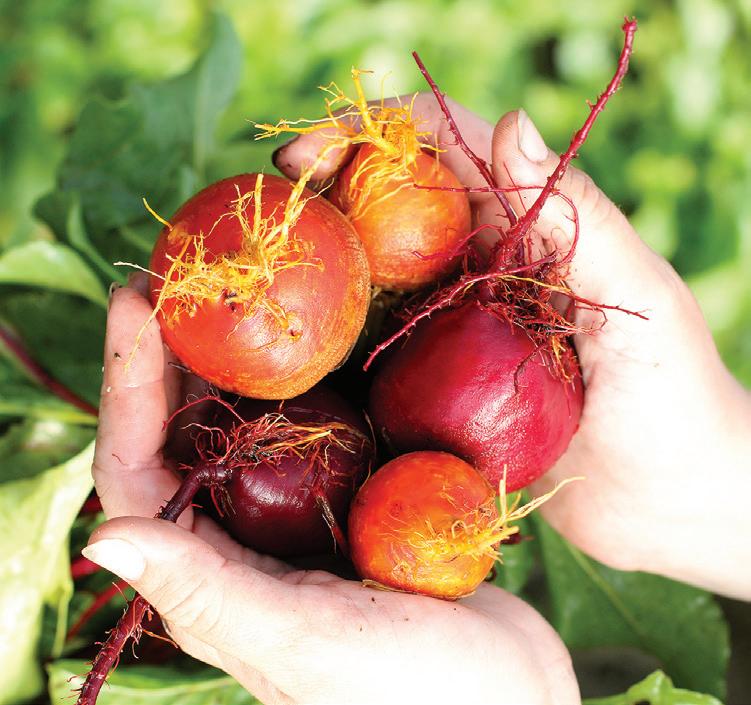
Story and photos by Eric Cox
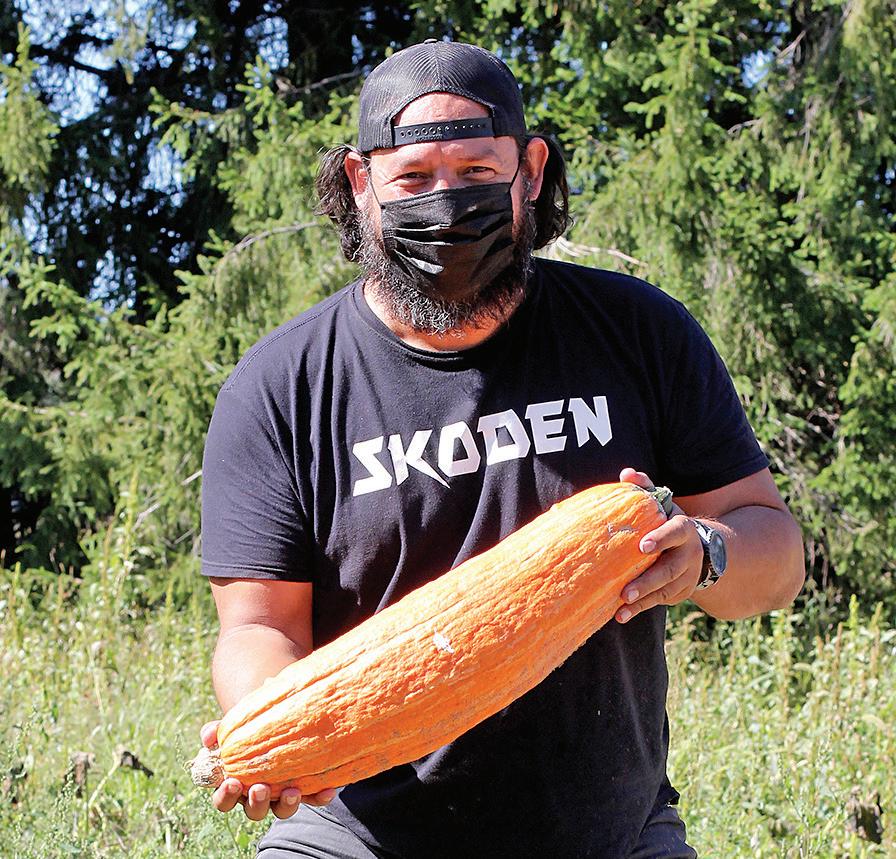
The Little Traverse Bay Band (LTBB) of Odawa Indians is using its green thumb to press a tribal hot-button issue: food sovereignty.
The tribe’s mission to become food independent took root four years ago at Ziibimijwang Farm, a 300-acre former pumpkin farm a few miles west of Carp Lake, near the tip of the mitt.
The project was conceived in 2015 when tribal leaders realized their citizens’ need for healthier, locally grown food, as well as knowledge about ancestral food production and preservation methods.
Stimulating the LTBB’s plan: an alarming rise of diabetes and pre-diabetic diagnoses within the tribe. With these challenges in mind, the LTBB set out to improve the tribe’s diet not by newfangled diets or exercise but by getting back to the foundational basics of generations before: farming, gardening, and cooking.
GAME CHANGER
According to Joe VanAlstine, LTBB’s director of food distribution and chairman of the farm board, most of the credit for bringing to life the tribe’s vision for the farm goes to Farm Manager Kafui OKai Adjei, whom everyone refers to as “KK.”
KK, an immigrant from Ghana with a bachelor’s degree in agriculture, is a well-known figure in Northern Michigan farm circles, according to VanAlstine, a U.S. Navy veteran and trained welder. For 14 years, KK served as the ag manager for Pondhill Farm, a sprawling
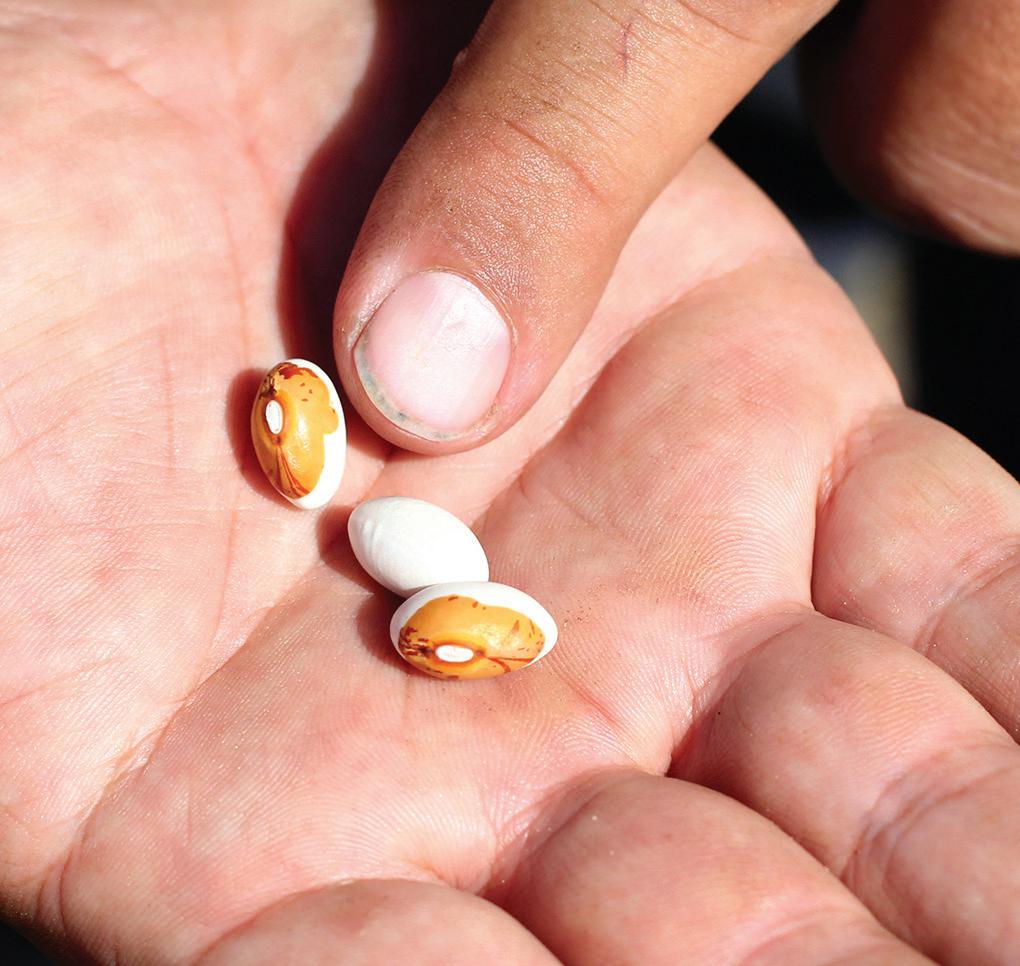
Top photo: Ziibimijwang Farm Manager Kafui OKai Adjei, whom everyone refers to as “KK,” inspects rows of winter vegetables at the LTBB’s 300-acre farm near Carp Lake.
First square photo, starting at left: Ziibimijwang Farm Marketing Manager Rosebud Bear Schneider scorches corn, a traditional corn preservation method used by Odawa Indians.
Second square photo: A farm employee holds freshly harvested red and yellow beets, a favorite of the farm’s customers.
Third square photo: Joe VanAlstine holds a gete okosomin squash, a traditional food among the Odawas.
Fourth square photo: Odawa pole beans, another variety of traditional tribal food, are also being reestablished at Ziibimijwang Farm.
destination north of Harbor Springs that’s home to a thriving working farm, brewery, winery, cafe, market, and many public and private events.
But when VanAlstine initially approached KK about the job, KK wasn’t interested; he wanted to remain at Pond Hill Farm. And Ziibimijwang Farm — a 300-acre swath, of which only 100 are tillable — was in a precarious position.
Only three years old, its first two farm managers were gone. And while it had earned enough to pay for its $600,000 purchase price, hundreds of thousands more were needed to repair and add infrastructure; install irrigation, greenhouses, and hoop houses; and buy a new tractor and other machinery.
Knowing the farm operation couldn’t continue asking for money from the LTBB tribal council, which had so far financed the operation, VanAlstine pinned all hopes on KK. He believed KK’s expertise and experience could help the farm sell enough produce to finally break even, if not push it into the black. So VanAlstine did the one thing he could do: He showed KK Ziibimijwang’s gorgeous, sprawling … potential.
“ … when we brought him out here, he saw the place and changed his mind [about staying at Pond Hill],” said VanAlstine.
OBSTACLES, ORGANICS & ULTIMATE GOALS
KK’s reputation opened the doors the LTBB desperately needed to enter — particularly those of regional farmers markets. And with a growing list of farmers markets at which to vend their goods, KK and VanAlstine saw their luck turning for the better — even in the face of the pandemic.
That should come as no surprise, given the obvious quality of the farm’s produce. A tour of the 100 acres reveals a large “Three Sisters Garden,” the siblings being staples of traditional Odawa cuisine: corn, beans, and squash.
Rows of towering, golden sunflowers flank beds of massive, orange-pink squash. Mounded dirt is crowned by stalks of corn whose ears are studded with brightly colored kernels, some black as coal and others ruby red. A short crop of bright purple lettuce runs neatly along a 50-yard grassy strip. Nearby, pumpkins wait for harvest in a field, and the green tops of carrots, still rooted in the sandy soil, await a gentle pull.
Though not officially certified as a USDA organic farm, all production at Ziibimijwang is done without chemical fertilizers, herbicides, or pesticides.
Even this late in the season, the farm is producing goods that will bolster its bottom line while adding fresher, more nutritional options for LTBB citizens. Ultimately, VanAlstine said, the tribe wants to be able to feed its own citizens by itself — without the help of the federal or state government.
That belief, which was embraced by the LTBB about six years ago, crystallized earlier this year when the pandemic struck. The situation brought supply chains into sharp focus worldwide, cementing the tribe’s resolve to push toward food sovereignty, locally, in spite of challenging times.
It seems to be working. A few weeks ago, VanAlstine and others at the farm distributed free food boxes to about 200 local tribal families. A variety of fresh produce — all grown at Ziibimijwang Farm — and other items comprised the boxes.
“People do like our produce, especially KK’s carrots and beets,” VanAlstine said. “Some think we’re a little pricey, but we try to make them understand that we have to make money to sustain the farm. Of course, a lot of people do understand. But, I think they do genuinely like our produce.” PRESERVING HISTORY & PRODUCE
Fresh vegetables are great in season. But VanAlstine said another facet of the farm involves reviving ancestral food preservation methods. Scorched corn, for example, is corn on the cob that’s blackened over a fire. Then the blackened kernels are cut off the cob and further dried, preserving them for future use in soups, etc.
“We’re having to relearn a lot of this stuff, and a lot of it is trial and error,” he said. “But they learned it somehow, so we can, too.
According to VanAlstine, knowledge of such food preservation practices is critical to sustaining the tribal culture and an important part of getting back to the simpler, healthier diets Odawa Indians have strayed from over the decades.
In fact, he, KK, and other partners in the farm’s growing future are working to resurrect some of the native vegetables once used by Odawa ancestors. While always aiming for heirloom variety vegetables, the team is also propagating and harvesting ingredients that have all but disappeared, such as pole beans, squash, different corn varieties, and wild rice.
To find out more about Ziibimijwang Farm and keep up with its current produce and events, search “Ziibimijwang Farm” on Facebook.
TASTE THE RAINBOW
A vast variety of Ziibimijwang Farm’s produce and products are available at both winter and summer farmers markets in Petoskey, Boyne City, Charlevoix, and Harbor Springs. Additionally, the farm supplies a seasonal fruit and vegetable store, Minogin Market, located at 229 S. Huron Ave., Mackinaw City. (231) 427-7001 You deserve to be listened to. You deserve to have your calls answered. You deserve to have a partner in this process who is responsive, professional and your trusted advocate.
Be the priority.

REALTOR
JENNIFER GASTON
jennifer@jennifergaston.com 231.313.0591
JENNIFER’S FEATURED LISTING

INCREDIBLE WEST BAY VIEWS $850,000 | MLS #1870571





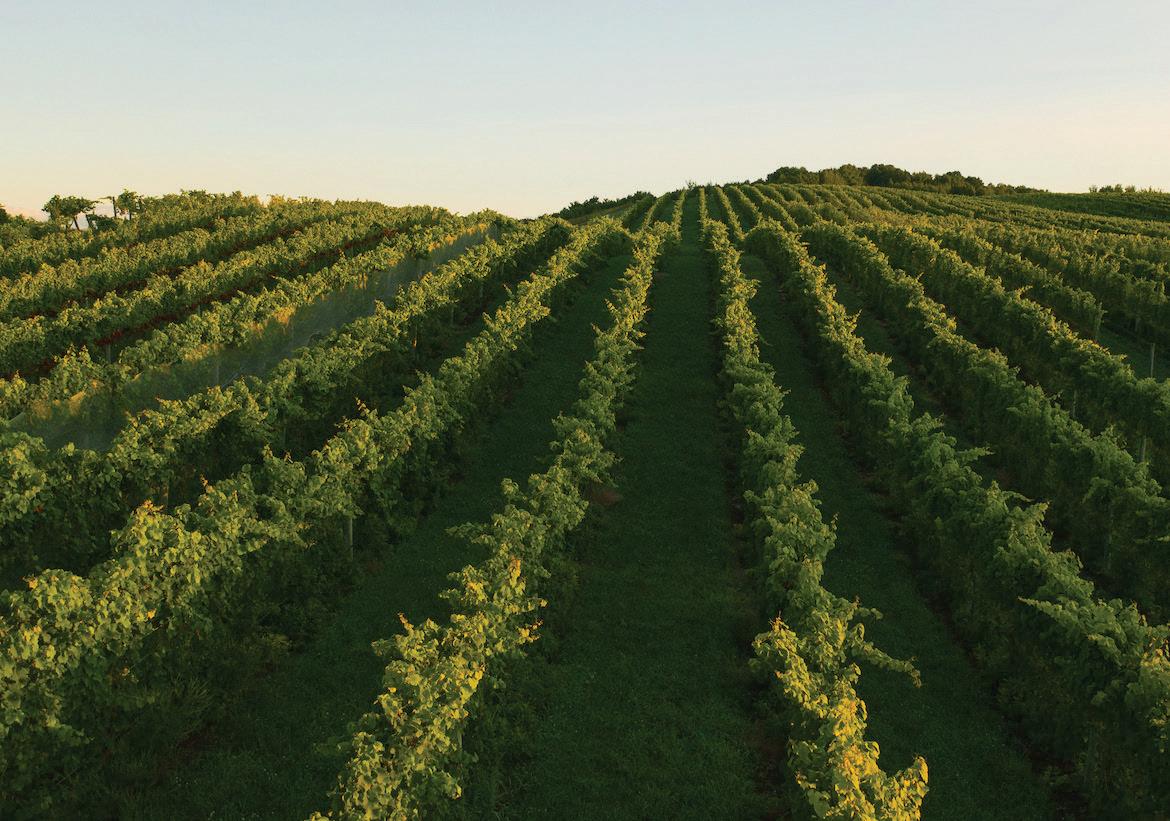
cocktail creations october splash, brought to you by 123 Speakeasy
Bel Lago Winery @bellagowinewinery
TEMPESTA 2016
For those who believe Michigan can’t deliver a high-quality red wine on par with the world’s best wine regions, Tempesta proves them wrong. This exceptional blend is only crafted during outstanding vintages that are worthy of carrying the Tempesta label. Even then, Bel Lago’s winemakers painstakingly review each barrel of wine that is considered to be a contender for the blend, choosing the select few deemed to be the absolute best. The result is a wine perfuming temperate, dark fruit and toasted oak that uncovers a harmoniously integrated flavor experience. Floral, fruity and earthy, with hints of chocolate and leather, Tempesta is an elegant wine that’s ready to impress. Available exclusively at Bel Lago.
Visit us Wednesday - Monday 12-6pm
6530 South Lake Shore Drive, Cedar • 231.228.4800 • www.bellago.com
Elevating the Human Spirit ™


We’re Hiring!
The Brisk Traveler

As the leaves change and the days get cooler, many drinkers will switch from lighter spirits to more hearty rum and whiskey. But this months cocktail holds off that temptation and shows that vodka doesn’t need to be seasonal fare.
Even hardcore bourbon drinkers will appreciate the sweet and sour combination that limencello and rose, and those peychaud bitters at the front of this drink add just enough punch to make us all feel a little better about Winter looming around the corner.
Ingredients • 1.5oz vodka • 1oz limoncello • 1oz rose syrup • .5oz simple syrup Shaken
Directions Add all ingredients to a shaker with Ice and shake for 15 seconds. Pour in a rocks glass over ice, and add two drops of Peychauds bitters. Garnish with a lemon wheel and enjoy. Cheers!
Difficulty:
We look forward to serving you our featured cocktails in person when it’s safe to reopen! For the most up to date information on re-opening and upcoming events, follow us on Facebook.

Work one-on-one with clients Help keep seniors safe at home Great pay, health and retirement benefits
866-929-9044 123 W FRONT ST #1B, TRAVERSE CITY comfortkeeperstc.com Alongside barstools, we Our drinks and food offer family-style arrangements of authentic Victorian and Eastlake seating. are all presented in a curated collection of vintage crystal and glassware. 231.753.8841 www.123speakeasy.com 14 • oct 05, 2020 • Northern Express Weekly Your text here We proudly use the best local, seasonal, organic, and foraged ingredients in our drinks and food.
CULTIVATING UNCERTAINTY How COVID-19 is affecting migrant workers Up North — and our agricultural economy
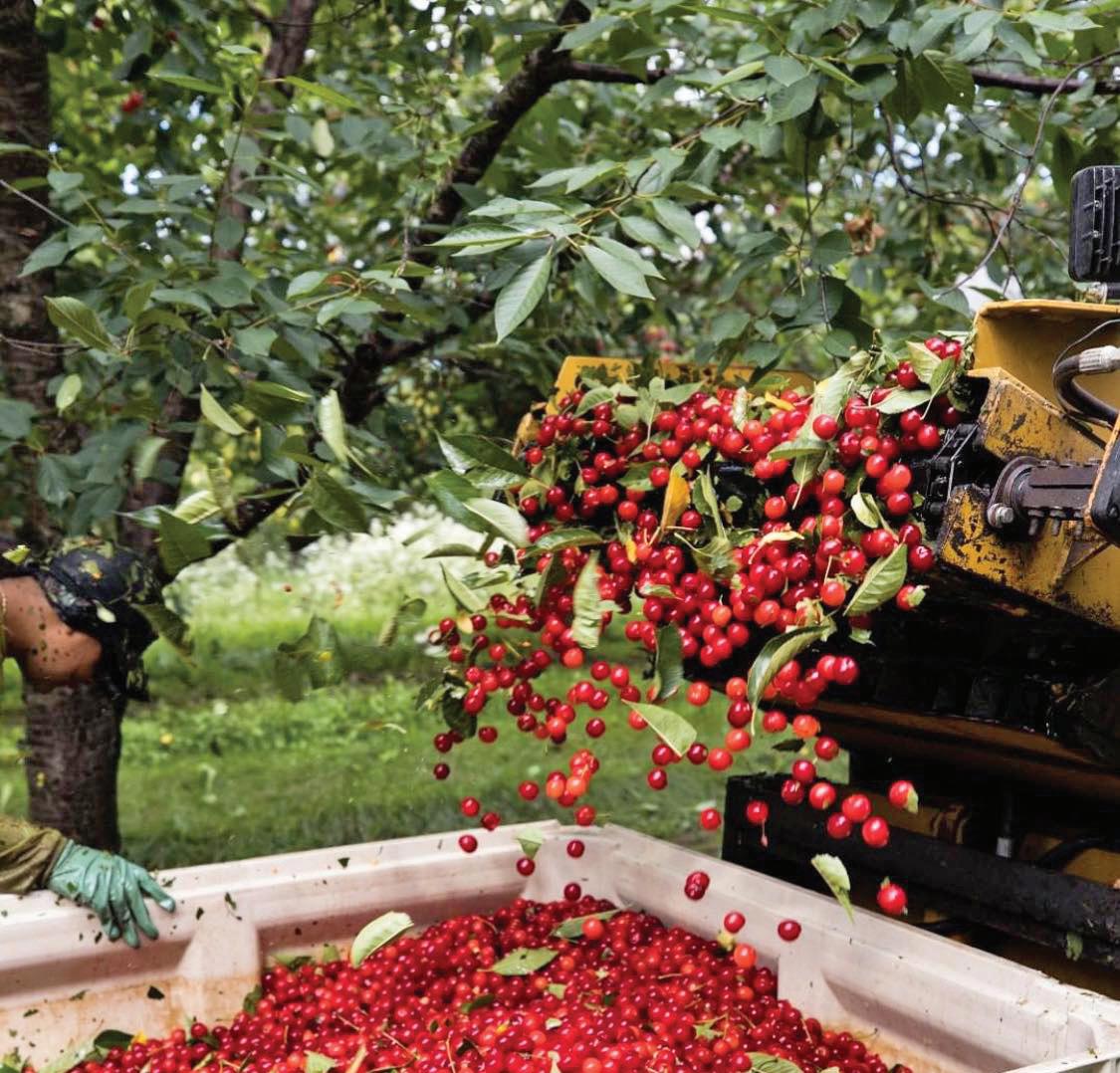

By Todd VanSickle
Cherry Bay Orchards president Mark Miezio remembers getting a phone call on Labor Day weekend that he hopes he never receives again.
“It was a very terrifying thing to get that phone call that one of our new workers tested positive for COVID-19,” he said.
Cherry Bay Orchards holds 4,000 acres throughout the state. Most of the farmland is located near Suttons Bay in Leelanau County, and is largely devoted to cherries, with some apples and pears. The farm depends on a migrant labor force that swells to more than 80 workers during certain seasons.
“If we have a case or know this pandemic comes through our operation, we need to be ready to shut down,” Miezio said. “We’re going to get through it, and I think that was the biggest risk and [reason for] sleepless nights during cherry harvest.”
Fortunately, Cherry Orchards was well equipped to deal with such a situation. It already had been screening its employees, which may have prevented an outbreak. Workers were also able to continue working in isolated environments.
“We had to get [the man with COVID-19] his own transportation, and we found some projects that he could work on by himself, not around other people,” Miezio said. “We had housing units available that we had set up for this issue.”
The COVID-19 positive employee had been living with four other people in housing provided by the orchard.
“We understood what our protocols were,” Miezio said. “The one gentleman had a 10-day isolation. And the other people that were living with him had 14 days of isolation after their last interaction with him.”
The president said the quarantine recently ended, and none of the workers are showing any symptoms. Department of Health and Human Services, the state does not track migrant COVID-19 cases specifically.
“I am not aware of any comprehensive accounting of positive tests just for migrant workers,” he said.
The COVID-19 pandemic has caused uncertainty and confusion for the agricultural industry, with the economic fate of migrant workers hanging in the balance and farmers left to incur costs and navigate through the evolving executive orders.
“Year to date, we are about $54,000 or more for COVID-related costs,” the orchard president said. “I just know those numbers because we just finished some of that accounting work.”
Cherry Bay Orchards, however, fared well. Not only did its COVID-positive employee recover, it had protections in place that successfully prevented the virus’ spread among its vital employees. It also received a $50,000 State of Michigan grant to help offset costs related to the pandemic. Not all agricultural businesses have been so lucky — or proactive.
Wheaton said the state is trying to do its part where it can. Migrant Program Specialists have distributed facemasks and COVID-19 information to migrant workers and their families, as well as PPE kits purchased through donations by the Regional Migrant Resource Councils. The staff has also worked to enable COVID-19 testing of agricultural workers as well as to provide supportive services to those workers who test positive. CHANGING NUMBERS & NAVIGATION
It is estimated that more than 60,000 migrant workers are needed throughout the year to support Michigan businesses in a variety of industries. About 25,000 of those migrant workers are needed in agriculture, according to Wheaton.
“The number of U.S. workers migrating to work in Michigan is down compared to previous years,” said Elyse Walter of the Michigan Department of Labor and
Economic Growth.
Most migrant farmworkers come from “supply states” that are identified by the U.S. Department of Labor. The five supply states and territories identified are Florida, Texas, North Carolina, Georgia, and Puerto Rico.
Yet Texas, Florida, North Carolina, and Georgia are among the top 10 states with the most COVID-19 cases. (California leads the way with 800,273 cases, according to the Centers for Disease Control and Prevention.
U.S. migrant workers generally stay for the duration of the season, with some workers arriving as early as February to begin the planting season and staying as late as midNovember, often transitioning from farm to farm as the harvest season goes on. The average stays for migrant workers range from four months to nine months, while foreign workers typically stay for shorter periods — generally 30–120 days, but some staying up to 10 months.
However, effective August 19, 2020, the U.S. Citizenship and Immigration Services, Department of Homeland Security issued an emergency rule change allowing agricultural employers to submit a petition to the USDOL requesting a temporary extension of stay for H-2A workers, an effort which could extend their H-2A temporary employment visas up to 3 years.
Of course, navigating through the laws and evolving executive orders can be timeconsuming and challenging for farmers and migrant workers who are already dealing with demanding deadlines and production schedules.
“There’s been so much legislation and stuff, it’s kind of tough to figure out exactly where you fall into some of these things,” Miezio said.
LOCAL SUPPORT
Arlene Resource Management is a family owned-and-operated farm labor contractor that handles the red tape for farmers who need migrant workers. It has partnered with several farms in Michigan, assisting them with the H-2A program, which allows agricultural employers who anticipate a shortage of domestic workers to bring nonimmigrant foreign workers to the U.S. to perform agricultural labor or services of a temporary or seasonal nature.
The management company also provides transportation, training, housing, and now compliance work related to COVID-19 executive orders.
“We are focused on compliance with the new order,” Arlene Resource Management Manager Beth VanDrie said. “Michigan has stricter laws than most states. It’s kind of been up to us, with a little bit of help from [Michigan Department of Agricultural and Rural Development], to navigate, with trying to figure out what exactly the order is dictating.”
She added that Arlene Resource Management is located in Manton and works hand-in-hand with Dutchman Farms, a longtime Christmas tree grower also located in Manton.
Together, Dutchman Farms and Arlene Resource Management have a combined 485 migrant workers. To date, none of the
workers have tested positive for COVID-19, said VanDrie. After a worker tests negative twice, he or she no longer has to be tested, the manager added.
“We’re doing what we needs to be done, and it’s been protecting the health and well-being of our employees, which is predominantly our goal,” VanDrie said.
“We are fortunate enough to be too large for a local facility to handle so the state stepped in and has been giving us free testing. It’s free right now, but we’ll see what happens down the line.”
She added that the workers are paid for their time for the testing, but it comes at an expense for the farmers.
“It’s a lot of paperwork on top of trying to get normal agricultural jobs done, which is already a challenge in itself,” VanDrie said. “We need trails on every employee.”
She estimates that the testing alone takes about an hour per person. “We have to stop what we’re doing out in the field and pull people off orchards,” said. “Out in the Williamsburg area and the Bear Lake area, from all over the state — we have to make sure that they get tested on the required schedule, which is a loss of production and is expensive. I would say even the paperwork in the office; the time trying to understand the compliance is an expense.”
Although the workers’ health is a priority, VanDrie believes some of the executive orders don’t fully make sense.
“Wearing masks when you are by yourself trimming in a tree field is a little absurd, but we do our best to navigate those orders,” she said.
More concerning is the potential for prices to increase for agriculture goods, VanDrie said.
“I definitely think that the price of agriculture goods is going to keep going up,” she said.
VanDrie explained that a large number of migrant laborers that typically travel from Florida and other states didn’t come this year, and farmers are still scrambling for workers.
“People are more concerned with traveling state to state. Those kinds of workers are just not available this year. So, I think that’s going to have a huge impact,” VanDrie said. “We will probably see a lot of fruit left on the trees. We’re still having farmers call daily that we are turning down. We just don’t have enough human resources to help them.”
At Cherry Bay Orchards, the president said many college students filled the gaps in the beginning of the pandemic when other tourism businesses like restaurants and hotels were not deemed essential and had to remain closed.
“It is not a trend I expect to continue,” he said.
JUST ANOTHER INDUSTRY UNKNOWN
Lewis McColley is the owner of Uncle Bill’s Farm, a 60-acre farm on Elk Lake Road in Williamsburg. The farm mainly grows strawberries, asparagus, peaches, cherries, and plums.
Uncle Bill’s Farm has only about two or three migrant workers; they are contracted through Arlene Resource Management. McColley,
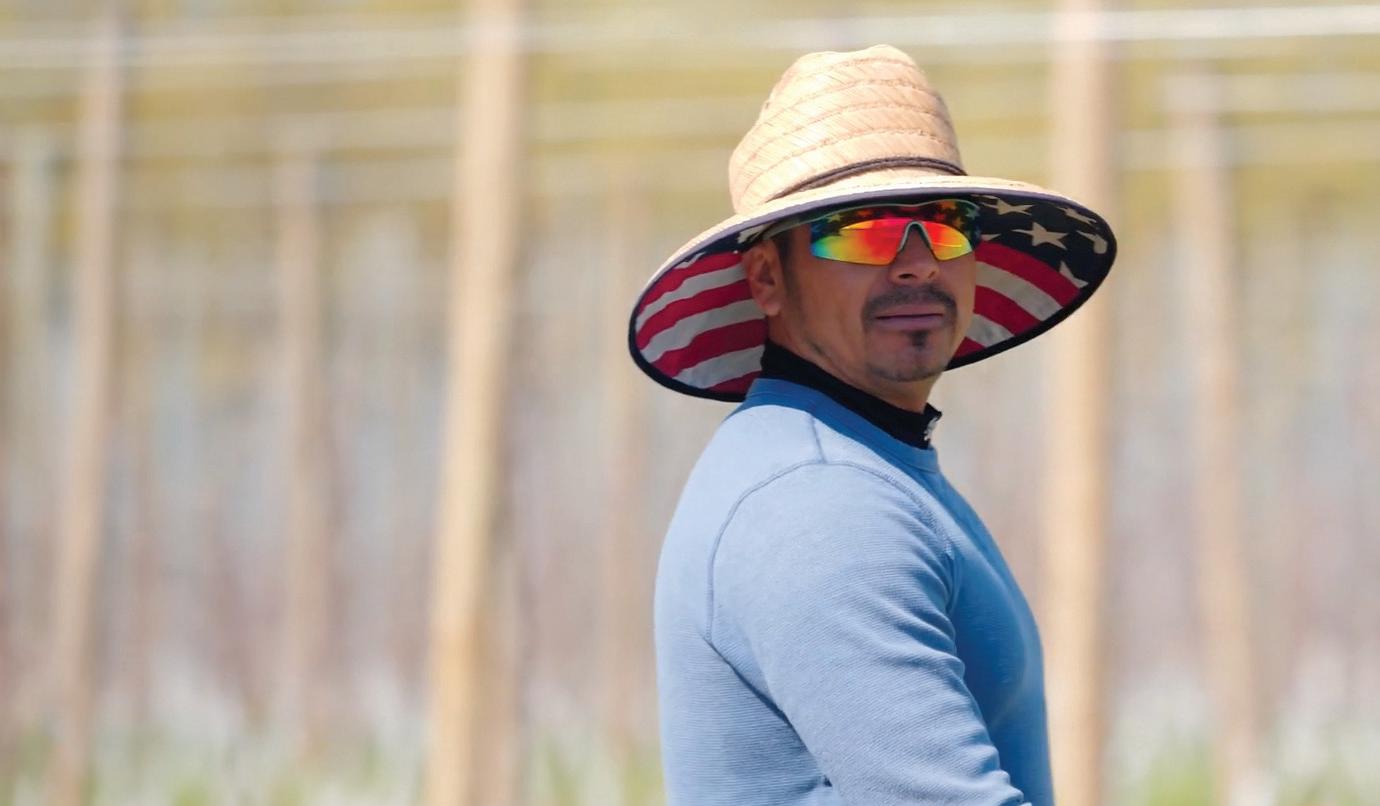
who relies heavily on those workers, said he started to worry when they hadn’t arrived for the season at a time when the U.S. and Mexico border was closed. However, he was reassured by VanDrie that they would arrive.
“I think they were a week late. That was in May,” McColley said. “It wasn’t as bad as it could have been. It was good that they kept [the border] open, or I would have been out of business. It is just the uncertainty. There’s enough uncertainty in farming, and with this thrown into the mix, it just makes it that much more tough.”
McColley said Arlene Resource Management handles all of the protocols put into place by executive orders, which helps alleviate some stress. The management group makes sure other farmers’ migrant housing is compliant but it also has added quarantine housing at their farm in Manton, another way farmers and workers receive safe support.
The Michigan Department of Natural Resources (MDARD) typically has three major types of housing inspections. The first is a preoccupancy/licensure inspection to ensure the housing provider has done due diligence to provide safe and wholesome housing.
The second is a follow-up on the implementation of corrective action plans documenting that the housing provider has made the corrections needed to be in compliance with Part 124 of the public health code.
Third, MDARD conducts occupancy inspections in support of in-season compliance with housing rules. This year, MDARD inspectors are also conducting COVID-19 outreach visits. During these visits, MDARD reviews COVID -19 mitigation plans and postings required under Executive Order 2020- 137, and it makes observations of whether or not workers are practicing social distancing and wearing PPE.
Farmers with Arlene Resource Management signed a contract for their migrant workers prior to the season and before the COVID-19 pandemic hit. An agreed price and term was set, leaving the COVID-19 expenses for things like PPE on the management company this year. VanDrie is hopeful that they will qualify for a grant through the State of Michigan to help off set any expenses.
Cherry Bay Orchard has seen one other silver lining in its business during the pandemic: More people stayed at home baking.
“There was a resurgence in people baking, and so all of a sudden there was a little bit of a spike in sales,” Miezio said.
As far as the price of agricultural goods rising, he thinks that there are more factors than just COVID-19 protocols. He points to the trade war with China, wildfires out West, and poor weather conditions to name a few.
He is uncertain what the future holds but remains optimistic.
“I hope a vaccine is in place by next year, and our labor force is healthy and ready,” Miezo said. “Also, I hope we get better as a society. That’s a big hope.”




